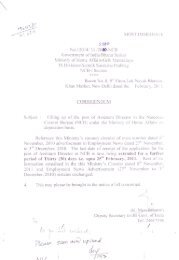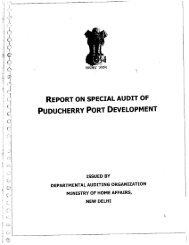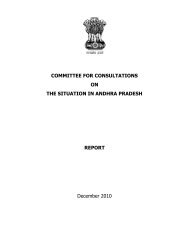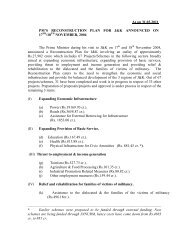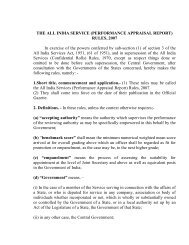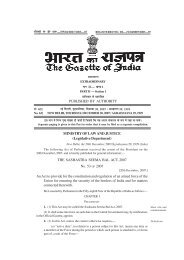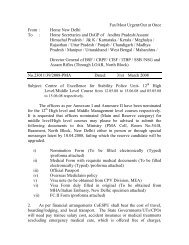Dr. Justice V.S. Malimath Report First pages - Ministry of Home Affairs
Dr. Justice V.S. Malimath Report First pages - Ministry of Home Affairs
Dr. Justice V.S. Malimath Report First pages - Ministry of Home Affairs
You also want an ePaper? Increase the reach of your titles
YUMPU automatically turns print PDFs into web optimized ePapers that Google loves.
222<br />
by a police <strong>of</strong>ficer not lower in rank than a Superintendent <strong>of</strong> Police is not<br />
tainted with any vice but is in strict conformity <strong>of</strong> the well recognised and<br />
accepted aesthetic principles and fundamental fairness-<br />
i. The confession should be recorded in a free atmosphere in the<br />
same language in which the person is examined and as<br />
narrated by him;<br />
ii. The person from whom a confession has been recorded under<br />
section 15(1) <strong>of</strong> the Act, should be produced before the Chief<br />
Metropolitan Magistrate or the Chief Judicial Magistrate to<br />
whom the confession is required to be sent under Rule 15(5)<br />
along with the original statement <strong>of</strong> confession, written or<br />
recorded on mechanical device without unreasonable delay;<br />
iii. The Chief Metropolitan Magistrate or the Chief Judicial<br />
Magistrate should scrupulously record the statement, if any,<br />
made by the accused so produced and get his signature and in<br />
case <strong>of</strong> any complaint <strong>of</strong> torture, the person should be directed to<br />
be produced for medical examination before a Medical Officer<br />
not lower in rank than <strong>of</strong> an Assistant Civil Surgeon;<br />
iv. Notwithstanding anything contained in the Code <strong>of</strong> Criminal<br />
Procedure, 1973, no police <strong>of</strong>ficer below the rank <strong>of</strong> an<br />
Assistant Commissioner <strong>of</strong> Police in the Metropolitan cities and<br />
elsewhere <strong>of</strong> a Deputy Superintendent <strong>of</strong> Police or a Police<br />
Officer <strong>of</strong> equivalent rank, should investigate any <strong>of</strong>fence<br />
punishable under this Act <strong>of</strong> 1987;<br />
v. The Police Officer if he is seeking the custody <strong>of</strong> any person for<br />
pre-indictment or pre-trial interrogation from the judicial<br />
custody, must file an affidavit sworn by him explaining the<br />
reason not only for such custody but also for the delay, if any, in<br />
seeking the police custody;<br />
vi. In case, the person, taken for interrogation, on receipt <strong>of</strong> the<br />
statutory warning that he is not bound to make a confession and<br />
that if he does so, the said statement may be used against him as<br />
evidence, asserts his right to silence, the police must respect his<br />
right <strong>of</strong> assertion without making any compulsion to give a<br />
statement <strong>of</strong> disclosure.<br />
19.6.5 Besides, while upholding the validity <strong>of</strong> sections 16, 19 and 20(3) <strong>of</strong><br />
the Act, the Supreme Court made certain observations, emphasizing the desirability<br />
<strong>of</strong> supplementing the law by making provisions therein.<br />
19.6.6 Section 16(2) and (3) empowering the Designated Court to take<br />
measures for keeping the identity and address <strong>of</strong> witnesses secret, was<br />
assailed on the ground that these provisions turn a trial under the<br />
provisions <strong>of</strong> TADA into a farce. In reply, it was contended that the<br />
Legislature merely regulated the right to fair trial and the right <strong>of</strong> the accused to



